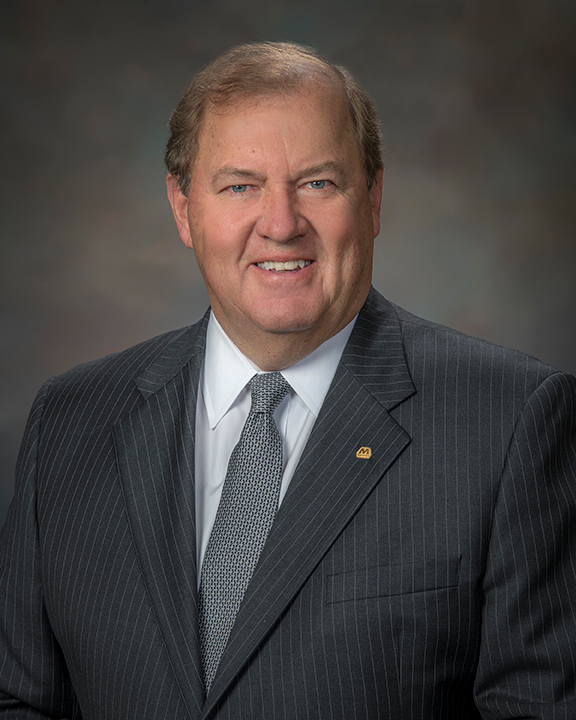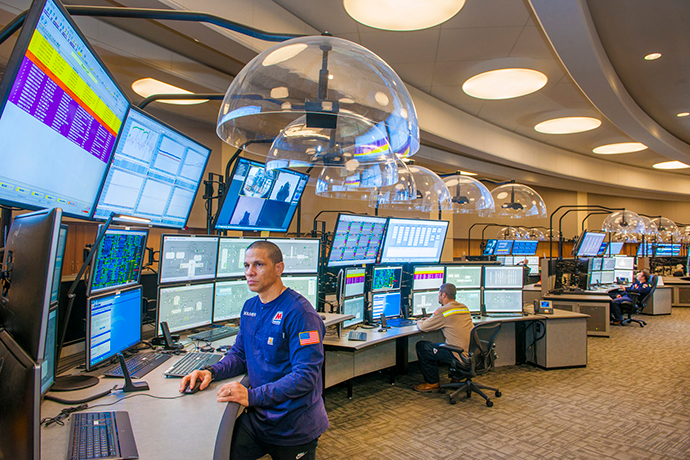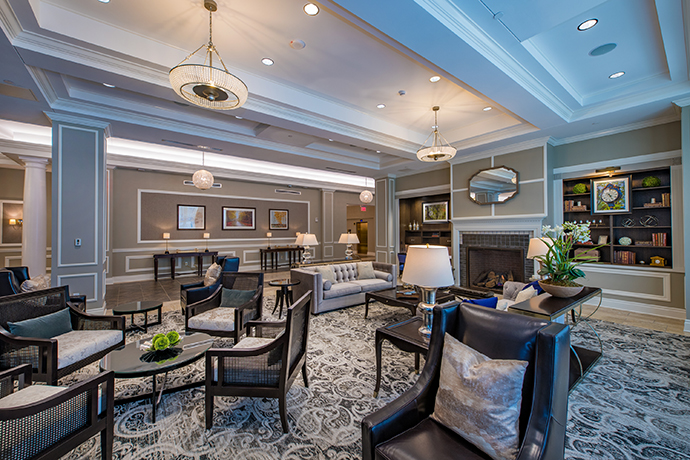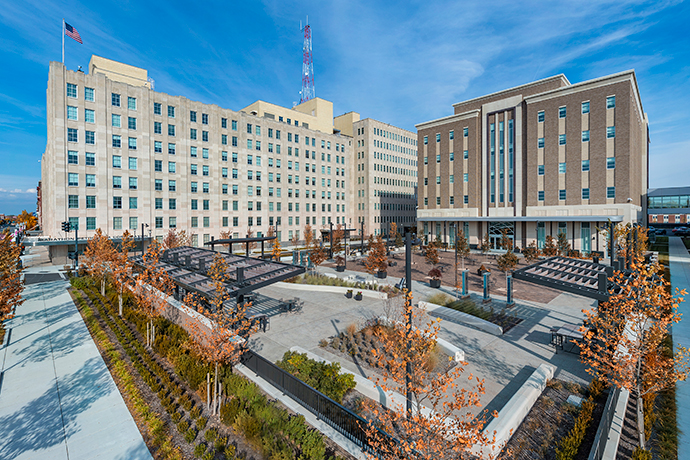Gary R. Heminger is Chairman and CEO of Marathon Petroleum, headquartered in Findlay, Ohio. Heminger now leads the country’s biggest refiner by volume, as a result of Marathon’s acquisition last year of its former rival, Andeavor. The Findlay native, who rose steadily through Marathon’s ranks after joining in 1975, spoke in late February with Site Selection Senior Editor Gary Daughters about his hometown and his Fortune 25 company. The version below has been lightly edited for clarity.

Site Selection: You have quite the story. Findlay native, grew up near Marathon, started in records storage, now CEO. That’s the short version of the Gary Heminger story. Could you fill it out a bit more?
Gary Heminger: Marathon has been a company that’s been steeped in tradition and steeped in leadership and mentorship. I’ve been very blessed in my career to have outstanding mentors that have helped the company thrive. We are known for building very strong leadership from within. It’s been an exciting career.
Site Selection: In what ways has Findlay been instrumental in shaping that culture you speak of?
Heminger: I might look at it a little bit the opposite. How has Marathon helped shape the culture of Findlay? Marathon has a long and esteemed history in Findlay for over 130 years. We have a very, very strong sense of community within Findlay, and the Marathon family is a very generous group. We provide about 65 percent of the United Way funding. That permeates not just through the United Way, but several of the hospital foundations, the University of Findlay and many other philanthropic organizations with the town. I would say it has permeated over the lifespan of Marathon in Findlay. We have a number of employees that take leadership roles in city council, the board of the hospital, the boards of other philanthropic organizations. It’s a very prosperous city, a very livable city with a great education system. While it’s a small community, we’re very successful in recruiting at all the major universities and from the best of the engineering programs, the IT programs, accounting, finance, law. The talent that we bring in sees our presence in Findlay as part of our heritage.
“We are known for building very strong leadership from within.”
Site Selection: How do you lure that top talent to Findlay, Ohio when some of it could go to Houston, to Dallas, and other big cities where the petroleum industry is prominent?
Heminger: We do hire talent into our Garyville, Louisiana or Galveston Bay refineries. Now we have refineries in L.A. and San Francisco, so we’ll hire some of our talent into our operating locations and some into our headquarters. Energy historically has been a very highly sought-after industry. Probably 75 percent of our hires will have gone through our internship program, sometimes for two or three years while they’re in college working on whatever discipline they’re in. We move them around to many different locations in our internship program, so they get a real feel for the company and a feel for the culture. Our intern program is really something different. When they come into it, we’re giving them structure and responsibility. So, they’re really a part of the company before they become a full-time employee.
Site Selection: How do you explain Findlay’s success in attracting and nurturing business?
Heminger: We have a very, very strong business and professional community within the city. I think it starts with the educational programs. We have some of the best schools in the state when you look at the scores and how our students perform when they go off to higher education. Bringing in the very high-level talent that we do certainly helps with that. The overall business community, not just Marathon, but the hospital, the medical community, the legal community, Cooper Tire and Rubber has their headquarters in Findlay. A number of very successful small businesses as well. We have a business and community mind that helps nurture business within the community.

Site Selection: What to you are the measures of a “pro-business” community?
Heminger: Pro-business can mean many different things. We are a company that has lots of big assets, but those assets aren’t necessarily in Findlay. We have now 16 refineries, 4,000 convenience stores, 8,500 Marathon-branded locations, 10,000 miles of pipeline, one of largest inland barge systems in the country. All those assets are spread about the country. Pro-business is how you take and continue to develop people in very strong leadership systems to be part of a vibrant community, and to be a vibrant community you have to be able to exude leadership.
Site Selection: This has been a very exciting year for Marathon. How might the city of Findlay benefit from Marathon’s acquisition of Andeavor?
Heminger: It’s a very large acquisition. Since we became a separately traded public company in 2011, the growth of our company has been tremendous. We purchased a big refinery in Galveston, Texas back in 2012. We bought all the Hess assets in 2012. We purchased MarkWest, the largest natural gas processing company in 2014. And now we’ve made this acquisition. We’ve been very successful in bringing new companies together and then integrating them. So, the big thing is integrating those companies, and we’ve decided to maintain our headquarters in Findlay. We’ve had many opportunities. We could go anywhere with our headquarters. But you can’t replace the knowledge, experience and tremendous work ethic that the people of northwest Ohio bring to the table. I think a smaller, micropolitan community like this is a competitive advantage for us versus some companies that are in much bigger energy corridors. We have very, very low turnover, which provides us with people who have tremendous experience and knowledge of the business, and we can then promote them from within.
“The talent that we bring in sees our presence in Findlay as part of our heritage.”
Site Selection: Has there ever been any pressure or any thought to moving Marathon headquarters out of Findlay?
Heminger: One of the biggest concerns we’ve had is about the flooding situation we’ve had in and around Findlay dating back to 2007. Yes, we’ve had some pressure of being able to maintain control of our assets. We have all our pipeline control systems in our office here. It’s tornado proof, it’s flood proof. I’ve worked very hard, as well as other members of the business community to find a solution, and I think we’re well down the path to finding a solution to be able to mitigate flooding and high water situations. I think that, within the next the next couple of years, we’ll pretty much get this completed. That has been the major issue. We have to be able to run 24/7. We manage 10,000 miles of pipeline out of this office 24/7, 365. We run all of our treasury, so you’re moving money 24 hours a day in and out of our system. So, you have to be able to have a safe environment where employees can get to work and know their families are safe at home as well. We’ve been able to get that accomplished, but that was one of my concerns back when we decided to make this our headquarters going forward. I’ve had several offers from big cities around the country in the Southeast, the Southwest, the Midwest. We just can’t replace the talent we have by moving the whole corporation somewhere else.
Site Selection: Are you saying the flooding has caused you to consider relocating?
Heminger: No. We had to make sure we could mitigate it. When you’re running a 24/7 pipeline operation, you have to have employees that can get to work and get home safely. We had to make sure that we were convinced that, again I come back to pro-business, how are we going to work together to provide a solution. We had to make sure we had a long-term solution in order to be able to mitigate this down the road. I believe we’re there but it’s taken many members of the community to work together to find a solution. I worked on that very hard, as well, and believe that we’re on the right track.
Site Selection: Do you feel the community’s response to the flooding has been adequate? The flooding has been going on for a long time, and the steps to mitigate it have only been undertaken recently.
Heminger: We’ve worked on this for a long time. It isn’t something that can only be done at the local level. You have to have the U.S. Army Corps of Engineers involved. The steps you have to go through from an infrastructure standpoint take a long time and it takes several organizations both at the state and within the federal side of the equation in order to make it happen. Has it been adequate? I believe it is now adequate. Is it timely? Of course, I would have liked to have seen it go faster, but I believe that we’re now really pressing ahead with the engineering solution to be able to mitigate this.

Site Selection: Do you expect your Findlay headcount to rise with the acquisition of Andeavor?
Heminger: It already has. We’ve already transferred a number of people to Findlay. It’s going take us another probably 18 months or so in order to be able to really combine the accounting and IT functions. We’re on two different systems and it’s going to take that long to be able to design the IT functions. We’re operating both accounting and IT infrastructure for both San Antonio and Findlay. Eventually we will be bringing more people into Findlay as we are able to integrate these systems into one.
Site Selection: I believe you’re at about 2,250 in Findlay right now. How much do you expect your headcount to go up?
Heminger: I think that number is a little bit low. I expect we’ll be at somewhere around 2,400 – 2,500 when we finish.
“I think a smaller, micropolitan community like this is a competitive advantage for us…”
Site Selection: What was the reasoning behind the significant investment in the Hancock Hotel. Now that it’s been open for a year or so, do you consider that money well spent?
Heminger: I certainly do. For a Fortune 25 company in a town this size, we had to have adequate hotel space, adequate conference room space, places where we could have training meetings and places for our employees to stay near our office. We did not have a really strong hotel in downtown Findlay, so this has provided a tremendous asset to the community. It’s not just for Marathon, it’s an asset to the community. A first-class restaurant, a first class hotel. We think it has been a tremendous addition to the community and a tremendous addition for our company to be able to use.
Site Selection: Any other thoughts on your hometown of Findlay?
Heminger: It’s a great city. I’m very proud of this city and proud of the families. At the end of the day, I look at one thing. Are we providing for the families? Are we providing the education system, the medical system and good jobs for people in and around the city? It’s not just the jobs at Marathon. All of us are very proud of what we have in this city, and we’re very proud as a company to be a part of this city.

